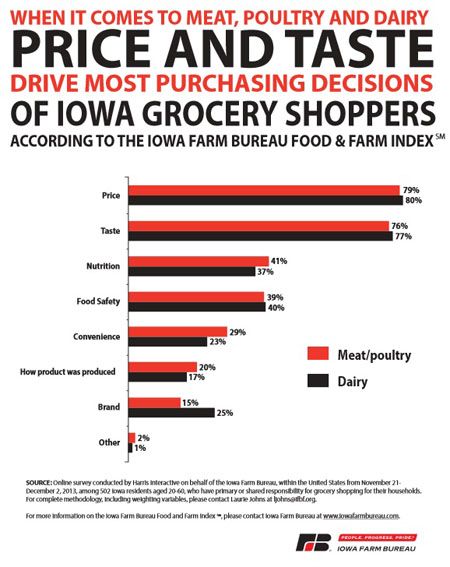New Survey Reveals I’m Pretty Normal
Author
Published
1/15/2014
Well, at least my grocery shopping habits are normal.
 The new
Iowa Farm Bureau Food & Farm Index asked Iowa grocery shoppers which 3 factors are most important to them when they determine which meat, poultry, and dairy products to purchase.
The new
Iowa Farm Bureau Food & Farm Index asked Iowa grocery shoppers which 3 factors are most important to them when they determine which meat, poultry, and dairy products to purchase.
Nearly 8 in 10 shoppers cited “price” and “taste.” The next most popular factors, “food safety” and “nutrition,” were only mentioned about half as often. Other (less popular) factors included “how the meat/poultry/dairy product was produced,” “brand,” and “convenience.”
It makes sense to me. Safe food is something I expect when I make any selection at the meat counter, and I’m not concerned that particular cuts are less safe than others. Nutrition is important too, but I know that I’m going to have a wide variety of meat, poultry, and dairy options to provide my family with the protein and important vitamins we need, so I might as well pick the options that taste good and provide good value.
I also pay attention to labels (according to the survey, 68% of Iowa shoppers do too), although it appears I read those labels a little differently than some Iowans. Of the shoppers who indicated they read meat, poultry, and dairy labels, 36% were looking for a “raised hormone free” label, and 32% were looking for “raised antibiotic free.”
Those labels don’t move me.
Then again, I was raised on a farm, and I work with farmers every day, which is uncommon, even in Iowa. I’ve helped provide medical care to hogs, so I understand how farmers abide by certain practices and work with veterinarians to care for their animals responsibly. I know that farmers administer antibiotics on an as-needed basis (to help ensure healthy animals enter the food chain), and they’re legally required to stop using antibiotics prior to an animal’s market date to make sure no antibiotic residue ends up in meat. The U.S. Department of Agriculture provides additional assurance that none of our meat has antibiotic residue by testing for it.
I’m also skeptical of labels that are a little too ambiguous, like “hormone-free” (all living creatures have hormones) or “raised sustainably.”
I’m not trying to discourage anyone from buying food with those labels or from reading labels altogether. Read away, my fellow Iowans.
Just understand that some labels are used for marketing purposes, as opposed to sharing material information about food safety or nutrition. If you’re having a hard time making the distinction, seek out a trusted source or two.
Again, I have a built-in advantage in that regard. Farmers aren’t my only source, but I put a lot of stock in information provided by folks who raise livestock and then feed their families the meat, poultry, and dairy that come from those animals.
I’d encourage you to seek them out. My guess is that you’ll find them willing to share how they care for their animals.
They’re pretty normal, too.
By Zach Bader. Zach is the Online Community Manager for Iowa Farm Bureau.